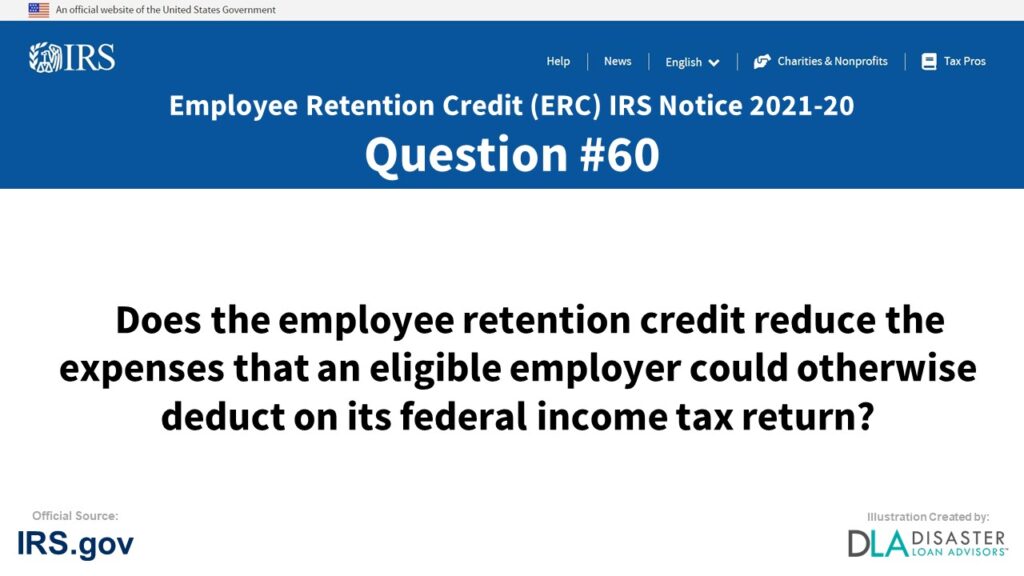
Question #60:
Does the employee retention credit reduce the expenses that an eligible employer could otherwise deduct on its federal income tax return?
Found under the L. Special Issues for Employers: Income and Deduction section of the Employee Retention Credit (ERC) IRS Notice 2021-20 with updated guidance to help business owners follow the current ERC rules.
The answer to question #60, Does the employee retention credit reduce the expenses that an eligible employer could otherwise deduct on its federal income tax return?, can be found below.
ERC IRS Notice 2021-20 Question #60:
L. Special Issues for Employers: Income and Deduction
Does the employee retention credit reduce the expenses that an eligible employer could otherwise deduct on its federal income tax return?
Yes. Section 2301(e) of the CARES Act provides that rules similar to section 280C(a) of the Code shall apply for purposes of applying the employee retention credit. Section 280C(a) generally disallows a deduction for the portion of wages or salaries paid or incurred equal to the sum of certain credits determined for the taxable year. Accordingly, a similar deduction disallowance applies under section 2301(e) of the CARES Act with regard to the employee retention credit, such that an employer’s deduction for qualified wages, including qualified health plan expenses, is reduced by the amount of the employee retention credit. (An employer does not, however, reduce its deduction for the employer’s share of social security and Medicare taxes by any portion of the credit).
For more information about the Employee Retention Credit (ERC) IRS Notice 2021-20, visit the Internal Revenue Service (IRS) Department of the Treasury, official IRS.gov tax website.
Conclusion and Summary on Does the employee retention credit reduce the expenses that an eligible employer could otherwise deduct on its federal income tax return? – #60 ERC IRS Notice 2021-20
The answer to Question #60: “Does the employee retention credit reduce the expenses that an eligible employer could otherwise deduct on its federal income tax return?” was answered in detail above. It was found under section “L. Special Issues for Employers: Income and Deduction” in IRS Notice 2021-20.
Leave a comment below if you have further questions on the Employee Retention Credit (ERC) or for clarifications on Does the employee retention credit reduce the expenses that an eligible employer could otherwise deduct on its federal income tax return?
Employee Retention Tax Credit (ERTC): Expert Assistance to Claim Your Business ERC Credit
Up to a $26,000 ERC Refund from the IRS for Each Employee
Disaster Loan Advisors can assist your business with the complex and confusing Employee Retention Credit (ERC), Form 941-X, and the Employee Retention Tax Credit (ERTC) program.
Depending on eligibility, business owners and companies can receive up to $26,000 per employee based on the number of W2 employees you had on the payroll in 2020 and 2021.
The ERC / ERTC Tax Credit Program is a valuable IRS tax credit you can claim. This is money you have already paid to the IRS in payroll taxes for your W2 employees.
We DO NOT charge a percentage (%) of your ERC Refund like some companies are charging. Some ERC firms out there are charging upwards of 15% to 35% of your ERC refund!
Our professional ERC fee and pricing structure is very reasonable in comparison.
If you are looking for an ERC Company that believes in providing professional ERC Services and value, in exchange for a fair, reasonable, and ethical fee for the amount of work required, Disaster Loan Advisors is a good fit for you.
Schedule Your Free Employee Retention Credit Consultation to see what amount of employee retention tax credit your company qualifies for.
Cover Image Credit: Irs.gov / IRS Notice 2021-20 / Disaster Loan Advisors.
